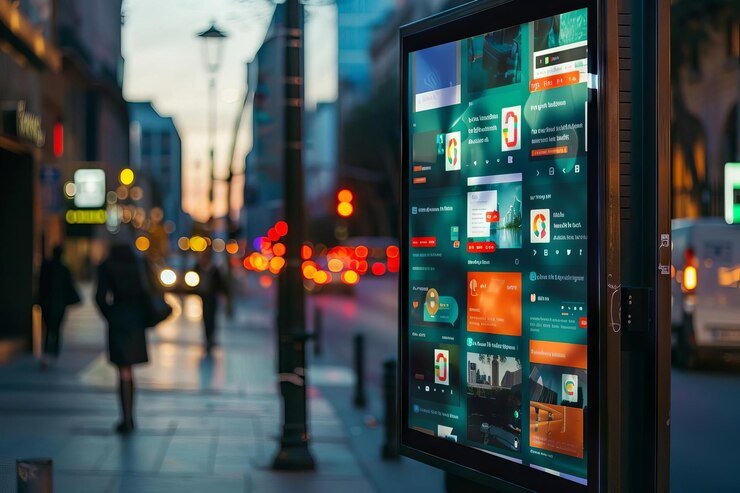Due to the current advancement in the digital communication sector, there is a need for efficient and effective management of digital signage systems, that is where digital signage integrators come in. These integrators are the glue that holds the hardware, software, and content together in a coherent, functional, and aesthetic digital signage system. In retail, corporate, and other public settings, digital signage integrators make sure that businesses get the most out of their digital signage investment.
What is a digital signage integrator?
A digital signage integrator is a company or organization that offers services in the design, installation, and maintenance of digital signage. These professionals are well versed in the right types of digital displays, media players, content management systems (CMS), and network infrastructure required to fulfill their clients’ needs. In this way, the creator of this system ensures that all the components are well incorporated in a way that makes the system not only useful but also very easy to maintain and upgrade.
Key Responsibilities of Digital Signage Integrators
Digital signage integrators are involved in many tasks that start from the planning phase and include the further support of the system. These responsibilities include:
• System Design and Consultation: Integrators analyze the goal, the budget, and the requirements of the client to provide a unique digital signage system. This entails choosing the right hardware, software, and network that will be used in the system.
• Installation and Configuration: The integrator takes care of the actual setup of the displays, media players, and other equipment. They also set up the system in such a way that the various parts of the system will be well integrated to work as a whole.
• Content Management: Integrators can help with the configuration of the CMS, staff training in the usage of the CMS, and even content management.
• Ongoing Support and Maintenance: After the installation, they also continue to offer services to the clients in order to maintain the system. This encompasses changes in the software, repairing faults that occur in the system, and repairs to the hardware.
Why It Is Crucial to Select Proper Digital Signage Integrator
Choosing the right digital signage integrator is very important to the success of any digital signage project. A good integrator will not only make sure that the system is properly designed and installed but will also offer recommendations on how to best populate the system and get more viewership out of it.
Experience and Expertise
To this end, the following is a list of factors that can help in choosing a suitable digital signage integrator: An experienced integrator will have a good knowledge of what is new and current in the market with regard to digital signage and will have other projects that they have done in different sectors.
Custom Solutions vs. One-Size-Fits-All
A good digital signage integrator should provide solutions that are unique to your situation and not a standard package that the company has been using for every client. This makes sure that your digital signage system is in harmony with the goals that you have set for your business and thus will give you the maximum possible return on investment.
Components of a Successful Digital Signage Integration
There are a number of elements that can be considered as crucial for a successful digital signage project and all of them need to be well-coordinated. These components include:
1. Hardware Selection
The type of hardware that is being used in a digital signage system is very important in determining the success of the system. This entails choosing the right displays, media players and the right form of mounting or installation systems. The integrator should also take into account features like the resolution of the display, brightness and ruggedness if the signage is to be placed outdoor or in areas that are likely to be thronged by many people.
2. Software and CMS
The CMS is the core of any digital signage system since it is the one that manages the content that is being displayed. A good integrator will assist you to select a CMS that is easy to use, expandable, and which can meet the content needs of your enterprise. The software should also be able to integrate with different media platforms and be able to stream content within some given time.
3. Network Infrastructure
It is important that proper network infrastructure is put in place to support the operation of digital signage systems. The integrator needs to guarantee that the network will be capable of withstanding the data traffic on streaming and content delivery, display management, and real-time updates.
4. Content Strategy
The saying that ‘Content is king’ cannot be farther from the truth than in the case of digital signage. A good content strategy has to be interesting, useful and appropriate to the target group. The integrator can help in the provision of a content strategy that a company may require in order to meet its objectives and engage customers.
5. Installation and Configuration
In order to make sure that all the components of the digital signage system are going to work effectively it is vital to install and configure everything properly. This entails ensuring that installation of display screens is done securely, configuring media players and ensuring that CMS is well configured.
The Role of Digital Signage Integrators in Different Industries
Digital signage integrators are very valuable in many sectors, and each of these sectors has its own specific needs and issues. Here’s how integrators contribute to different sectors:
Retail
Digital signage is employed in the retail sector for the purpose of improving the shopping experience, increasing product awareness and sales. Integrators assist the retailers in designing exhibits that are lively and engaging to passers-by and convey the intended messages. They also make sure that the signage is well positioned in a bid to enhance the effectiveness of the signage.
Corporate
Digital signs are applied in the corporate sector for the purpose of conveying information to employees, which may include company updates, employees’ accomplishments and messages. Integrators create systems that are easy to maintain and alter so that the appropriate messages get to the appropriate employees at the appropriate time.
Healthcare
In healthcare, it has been applied for patients’ information, directions, and timely updates, for instance, the waiting time. Integrators in this sector must therefore be very careful to ensure that they meet healthcare standards, and that communication is easy and unambiguous.
Education
Digital signage is applied in educational institutions to disseminate information to the students, teachers, as well as other people in the institution. Whether it is to convey important notices such as emergencies to advertise events, digital signage assists in enhancing the engagement level of the campus community. The integrators in this field ensure that the systems are reliable, simple to use, and they are able to address the different communication needs of schools and universities.
Hospitality
In the hospitality industry, the primary application of digital signage is to improve the experience of the guests to the extent of directing them to different parts of the hotel or presenting some services and products offered. Integrators cooperate with hotels, resorts and other hospitality establishments in order to design and produce the necessary and effective signs and visual systems that contribute to the overall comfort of the guests.
Emerging Trends in Digital Signage Integration
The field of digital signage is also not an exception, as the developments of new technologies and trends are being introduced in the market every now and then. Here are some of the latest trends that digital signage integrators are adopting to stay ahead of the curve:
Interactive Touchscreens
The use of touch screens in digital signage is on the rise, especially in the retail and hospitality industry. These are screens that enable the user to have some form of interaction with the content that has been presented to him/her.
AI and Machine Learning
The digital signage systems are now being complemented with AI and machine learning to provide relevant content to the consumers. Some of the data that these technologies use include customer behavior and demographic information and hence, businesses can be able to present content that will be most relevant to the customer.
4K and 8K Displays
With the developments in display technology, 4K and 8K screens are gradually being adopted in digital signage. These are ultra-high-definition screens and are perfect for any setting that requires a high-definition display.
Sustainability
The sustainability factor is a relatively new factor that has to be taken into consideration when integrating digital signage. It is currently seen that integrators are heavily emphasizing energy-efficient chips and other hardware, green building materials, and systems that can minimize waste and energy utilization.
Conclusion
It is therefore important to engage digital signage integrators in the cause of implementing digital signage systems. Their experience in the designing, implementing, and management of systems guarantees that organizations can reach their audience and accomplish their marketing objectives. Thus, through following tendencies and innovations, integrators contribute to the increase of companies’ competitiveness in the rapidly developing digital environment.





